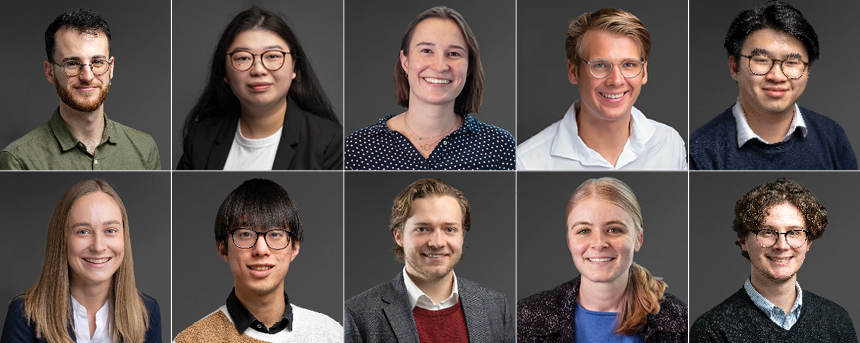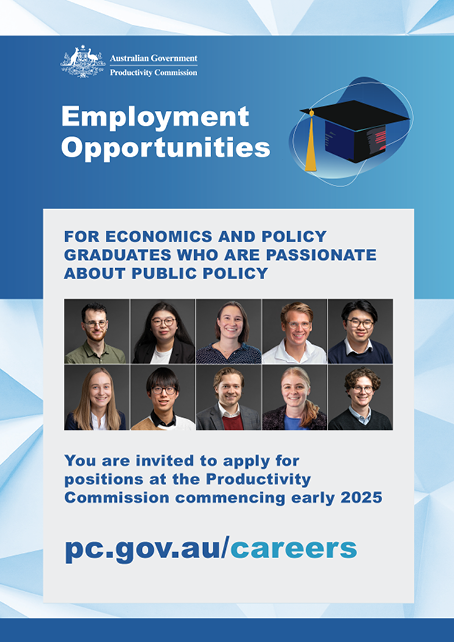Do you enjoy exploring data, undertaking research and producing recommendations?
Would you like an opportunity to provide advice on a diverse range of key policy challenges facing Australia, in an internationally recognised agency?
Applications for our 2025 Graduate program are now closed. Applications for our 2026 intake will be open in March 2025.
Subscribe for email updates

Read about the selection process
Some of the benefits of working with us
20 days
annual leaveOngoing
training$77,318
starting salaryFlexible
working conditions15.4%
super18 days
personal leaveSee what else the Commission has to offer
Hear from our previous graduates
About the Productivity Commission
Transcript of about us
[Sentences alternate between Male and Female speakers - starts with male]
The Productivity Commission is an independent research and advisory agency for the Australian Government.
While the government largely determines our work program, our findings and recommendations are independent and based on our own analysis and judgment.
Not only do we look at economic issues, but social and environmental issues too.
Our research and policy advice can help governments improve or create better policies to benefit all Australians.
Our main role is to conduct public inquiries and studies into current issues.
For example our inquiry into disability support was used in creating the National Disability Insurance Scheme.
Our projects provide opportunities for different points of view to be heard and considered.
Participation in our inquiries or Commissioned studies is encouraged and gives you the opportunity to have a say in Australia’s public policy formation.
You can participate by making a submission to us, it’s open to all. Submissions can be a short email or letter outlining your views or a much more substantial document.
Providing evidence such as documentation, data or research to support your viewpoint is always useful.
Often after we release a draft report, we hold hearings that are open to the public.
Anyone can participate whether it be elaborating on their submission or simply providing relevant information to the Commissioners.
Whether you want to speak at a hearing or just observe, you will be able to book a spot via our website.
The Commission also undertakes additional research. Some of this research supports our inquiries as well as helping outline future directions for reform.
You can find out more about us and our current projects by heading to our website, pc.gov.au
Invitation to apply from the Chair
Transcript of invitation
Danielle Wood, Chair, Productivity Commission
[Danielle speaking] If you are looking for graduate careers in 2025, I'm going to tell you about why the Productivity Commission could be for you.
Hi, I'm Danielle Wood, Chair of the Productivity Commission and former PC graduate.
For those of you that don't know about us, we are the Australian Government's preeminent policy research and advisory body.
We advise the Government on issues from economic policy to social policy to environmental. So to give you some examples of recent reports, we've looked into the mental health system and how it impacts the lives of Australians. We've grappled with the issue of housing and homelessness.
We've thought about how we can improve living standards for all Australians.
So if you're interested in this kind of deep policy work, we are a really unique place to work.
We get the time to think deeply about issues, to do analysis and research, to consult broadly, and then to put evidence backed recommendations to government.
I can say as a relatively new side of myself, it's a fun place to work. It's a warm it's an intellectually curious environment, and it's a place where you get to learn from everyone, from your fellow graduates right up to our fantastic team of commissioners.
So if this sounds like it's for you, we take a cohort of graduates each year from different academic backgrounds.
We prioritize intellect, curiosity and a passion for public policy and making a difference.
You can find out more on the PC website and we look forward to your application.
We have offices in Canberra and Melbourne, our staff enjoy flexible, hybrid working, in the office and from home
Why is the Productivity Commission such an interesting place to work?
Transcript of video
Why is the Productivity Commission such an interesting place to work?
People
Jeremy Kamil, Senior Research Economist, Melbourne
[Jeremy speaking] The best part about working here is the people.
They're smart, they're fun, and they love to engage in in good economic debate. We work together and we can turn some good ideas into great ideas.
Visits
Sally Harvey, Senior Research Economist, Melbourne
[Sally speaking] The most rewarding part of my job is the visits that we do with people over the course of an inquiry or a study, having people generously contribute their views and experiences and hearing how policy affects their lives.
Policy
Lachlan O'Neil, Public Policy Analysis / Research Economist, Melbourne
[Lachlan speaking] Sometimes when you're working on one of these projects, you find out some really interesting or unexpected things.
For example, when I was working on the National School Reform Agreement Review, I was really surprised by the lack of publicly available data on students with disability.
This was a good project to work on because it's a really interesting area of public policy and we got to talk to quite a lot of different stakeholder groups and hear about what they want to see changed in schooling in Australia and I really enjoyed that experience.
Variety
Anna Law, Senior Research Economist, Canberra
[Anna speaking] I really enjoy the challenge of working out a new policy area every 12 to 18 months.
It's one of the only places that you get the time to be able to do in-depth research and analysis on the problem areas that are affecting the Australian economy and people.
[Smiling and laughing staff]
pc.gov.au/careers
How do Productivity Commission reports come together?
Transcript of video
[Strong text represents text in video]
How do Productivity Commission reports come together?
Sara Collard, Inquiry/Research Manager, Melbourne
[Sara speaking] So there's a really diverse range of tasks that go into a project at the Commission.
At the start of the project, there'll be a lot of brainstorming and scoping and working together as a team to have a think about what are the key questions that we need to answer as a group to, to deliver a coherent set of findings and recommendations.
And then as we go on, there's a lot of analysis, so a lot of desktop research and gathering of evidence.
There's quantitative work, so there might be a modelling component depending on the type of questions that we're looking at and also a really big part of what we do at the Commission is Stakeholder engagements, talking to people, having meetings, roundtables, public hearings and and getting submissions from the public.
[Map of Australia with text appearing and disappearing] Stakeholders, meetings, roundtables, public hearings, submissions
[Sara continues] And then there's a big writing component because we deliver our findings and recommendations as a report to the government and to and to the public.
[Quick demonstration of someone clicking on a link on the Productivity Commission's website]
[Sara continues] So that's all part of our normal project work. But in addition to that, we have a lot of extracurricular activities in the office as well.
So we'll often have seminars where we bring in external speakers to talk about policy issues that are relevant to what we're looking at at the time.
And a lot of morning teas and lunches and happy hours and things like that, and also a lot of training and learning development opportunities.
[Smiling and laughing staff]
pc.gov.au/careers
